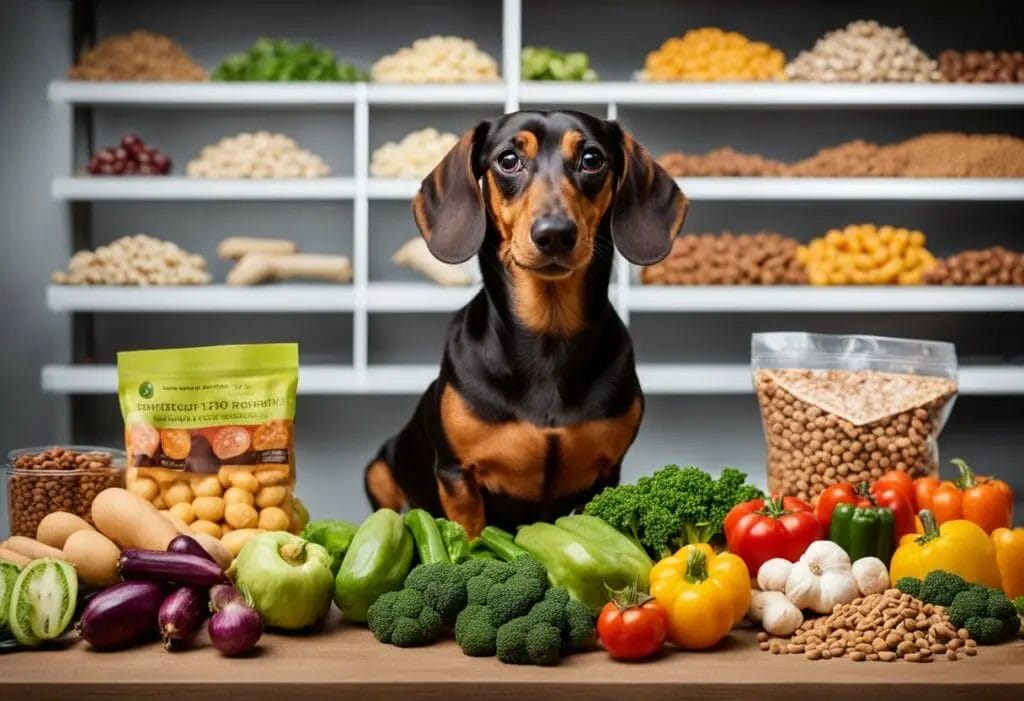As dachshund owners, it’s important to understand the nutritional needs of your furry friend at different life stages. Proper nutrition is essential for maintaining your dachshund’s health and quality of life. In this article, we’ll explore the best nutrition plans for dachshunds at different life stages.

When it comes to nutrition, dachshunds have unique needs based on their age, size, and activity level. Puppies require a diet that is high in protein and fat to support their growth and development.
As they age, their nutritional needs change, and senior dachshunds require a diet that is lower in protein and fat to maintain a healthy weight and prevent health issues.
It’s important to choose a high-quality dog food that meets your dachshund’s nutritional needs. Look for dog food that contains high-quality protein sources, healthy fats, and essential vitamins and minerals.
In the following sections, we’ll discuss the best nutrition plans for dachshunds at different life stages, providing hints and tips to help you keep your furry friend healthy and happy.
Understanding Dachshund Nutritional Needs
Proper nutrition is essential for maintaining good health and ensuring a long and happy life for your pet.
Dachshunds require a balanced diet that contains an adequate amount of protein, fat, minerals, and vitamins. The American Feed Control Officials (AAFCO) recommends that adult Dachshunds should consume a diet that contains at least 18% protein, while puppies and lactating females should consume a diet that contains at least 22% protein.
When it comes to fat, Dachshunds need moderate amounts to keep their bones, muscles, and organs healthy. The diet should also contain vitamins and minerals that are essential for their growth and development.
It is important to ensure that your Dachshund’s diet is of high quality and balanced. Feeding your pet with low-quality food can lead to health issues such as obesity, dental problems, and digestive issues.
To ensure that your Dachshund gets the right nutrition, you should choose high-quality dog food that contains all the essential nutrients. You can also supplement their diet with fresh fruits and vegetables, such as carrots, green beans, and sweet potatoes.
Remember that every Dachshund is unique, and their nutritional needs may vary depending on their age, weight, and activity level. Therefore, it is essential to consult with your veterinarian to determine the best diet plan for your furry friend.
Feeding Guidelines at Different Life Stages
Feeding your Dachshund the right nutrition at the right time is crucial for their growth and development. Different life stages require different feeding guidelines, and it’s important to know what to feed your Dachshund at each stage of their life.
Puppy Feeding
Puppies require a lot of calories to support their growth and development. When your Dachshund is a puppy, it’s recommended to feed them 3-4 small meals per day. The amount of food you should feed them depends on their age, weight, and activity level. As a general rule, feed them 1/4 to 1/2 cup of high-quality puppy food per meal.
It’s important to avoid overfeeding your puppy, as excess weight gain can lead to obesity and health problems later in life. Monitor your puppy’s weight and adjust their feeding schedule accordingly.
Adult Feeding
Once your Dachshund reaches adulthood, their feeding schedule should be adjusted to 2 small meals per day. The amount of food you should feed them depends on their weight, activity level, and overall health. As a general rule, feed them 1/4 to 1/2 cup of high-quality adult dog food per meal.
It’s important to monitor your adult Dachshund’s weight and adjust their feeding schedule accordingly. If they are gaining weight, reduce the amount of food you’re feeding them. If they are losing weight, increase the amount of food you’re feeding them.
Senior Feeding
As your Dachshund ages, their metabolism slows down and they become less active. This means they require fewer calories and a different type of nutrition. Senior Dachshunds should be fed a high-quality senior dog food that is lower in calories and higher in fiber.
It’s recommended to feed your senior Dachshund 2 small meals per day. The amount of food you should feed them depends on their weight, activity level, and overall health. As a general rule, feed them 1/4 to 1/2 cup of high-quality senior dog food per meal.
It’s important to monitor your senior Dachshund’s weight and adjust their feeding schedule accordingly. If they are gaining weight, reduce the amount of food you’re feeding them. If they are losing weight, increase the amount of food you’re feeding them.
Choosing the Right Food for Your Dachshund

When it comes to feeding your Dachshund, choosing the right food is essential to ensure they remain healthy and happy throughout their life. There are two main types of food you can feed your Dachshund: commercial dog food or homemade dog food. Let’s take a closer look at each option.
Commercial Dog Food
When choosing commercial dog food, it’s important to look for high-quality options that contain animal protein, such as meat, chicken, or fish. You should also look for a food that is formulated to support your Dachshund’s specific needs. For example, Dachshunds are prone to back problems, so you may want to choose a food that is formulated to support joint health.
When choosing a commercial dog food, you should also pay attention to the ingredients list. Avoid foods that contain fillers, such as corn or grains, as these can be difficult for your Dachshund to digest. Instead, look for foods that contain high-quality ingredients, such as vegetables and fruits, which can provide your Dachshund with essential vitamins and minerals.
Homemade Dog Food
If you prefer to make your own dog food, you should aim to create a balanced and nutritious meal that contains animal protein, vegetables, and fruits. You should also avoid using ingredients that can be harmful to your Dachshund, such as onions or grapes.
When making homemade dog food, it’s important to ensure that your Dachshund is getting all the nutrients they need. You may want to consult with a veterinarian or canine nutritionist to ensure that your homemade dog food is providing your Dachshund with a balanced diet.
Whether you choose commercial dog food or homemade dog food, it’s important to pay attention to the type of food you are feeding your Dachshund. You should avoid foods that contain artificial flavors or preservatives and instead opt for high-quality dog food that is made with natural ingredients. By choosing the right food for your Dachshund, you can help ensure that they remain healthy and happy throughout their life.
Foods to Avoid and Safe Treats

As a dachshund owner, it is important to know which foods are safe and which ones can be harmful to your furry friend. Here are some foods to avoid and some safe treats for your weiner dog:
Foods to Avoid
- Chocolate: This sweet treat is toxic to dogs and can cause vomiting, diarrhea, seizures, and even death.
- Grapes and raisins: These can cause kidney failure in dogs, so it’s best to avoid them altogether.
- Onions and garlic: These can damage your dog’s red blood cells and cause anemia.
- Macadamia nuts: These can cause lethargy, vomiting, and hyperthermia in dogs.
- Xylitol: This artificial sweetener is highly toxic to dogs and can cause seizures, liver failure, and even death.
- Cooked bones: These can splinter and cause blockages or tears in your dog’s digestive system.
Safe Treats
- Peanut butter: This is a great source of protein and healthy fats for your dachshund. Just make sure to choose a brand that doesn’t contain xylitol.
- Bread: This is a safe treat for your dog in moderation. Just make sure it doesn’t contain any harmful ingredients like garlic or onion.
- Oatmeal: This is a great source of fiber and can help regulate your dog’s digestion. Just make sure it doesn’t contain any added sugar or sweeteners.
- Fatty acids: These are essential for your dog’s coat and skin health. You can find them in fish oil supplements or in foods like salmon.
- Eggs: These are a great source of protein for your dog. Just make sure they are fully cooked and don’t contain any harmful ingredients.
- Raw food: Some dachshund owners prefer to feed their dogs a raw food diet. This can be a safe and healthy option, but it’s important to do your research and make sure your dog is getting all the nutrients they need.
Remember, table scraps should be avoided as much as possible, as they can upset your dog’s stomach and lead to obesity. Stick to a balanced nutrition plan and give your dachshund treats in moderation.
Health Concerns and Diet Adjustments

As your dachshund ages, their nutritional needs will change. It is important to adjust their diet accordingly to ensure their continued health and well-being. Here are some health concerns and diet adjustments to keep in mind at different life stages:
Puppies (8 weeks to 1 year)
During their growing phase, puppies need a diet that promotes healthy growth. A diet high in protein, fats, and essential nutrients is essential. According to the AAFCO (Association of American Feed Control Officials), puppies need a minimum of 22.5% protein and 8% fat in their diet. As they grow older, the protein and fat content can be reduced to 22% and 5%, respectively.
It is also important to feed puppies frequently throughout the day. Puppies aged 8 to 12 weeks should be fed four meals a day, while puppies aged 3 to 6 months should be fed three meals a day. Once they reach 6 months to 1 year, they can be fed two meals a day.
Adults (1 year and older)
Once your dachshund reaches adulthood, they only need to be fed once or twice a day. The amount of food they need depends on their size and activity level. Adult dachshunds should eat around 1 to 1 ¾ cups of food a day, while miniature dachshunds should eat between ¾ of a cup to 1 cup of food a day.
It is important to monitor your dachshund’s weight and adjust their diet accordingly. An overweight dachshund is at risk for health issues such as diabetes, heart disease, and joint problems. If your dachshund is overweight, reduce their food intake and increase their exercise.
Health Concerns
Dachshunds are prone to certain health issues, such as back problems and dental issues. It is important to feed them a diet that promotes overall health and well-being. A diet high in antioxidants, such as vitamins C and E, can help boost their immune system and protect against free radicals.
It is also important to feed your dachshund a diet that is high in calcium to promote healthy bone growth. However, be careful not to overdo it. Too much calcium can lead to health issues such as kidney stones.
When choosing a dog food for your dachshund, look for one that meets the AAFCO’s standards and does not contain by-products or fillers. Consult with your veterinarian to determine the best diet for your dachshund’s specific needs.
Providing your Dachshund with a balanced diet that contains all the essential nutrients is crucial for maintaining their health and ensuring a long and happy life.
